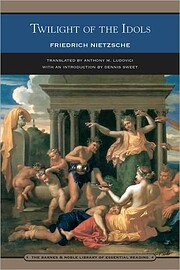

Click on a thumbnail to go to Google Books.
|
Loading... Twilight of the idols (original 1888; edition 2008)by Friedrich Wilhelm Nietzsche, Anthony M. Ludovici (Translator), Dennis Sweet"جدل آخرین سلاح است برای کسی که سلاح دیگری ندارد. باید به زور نشان دهی که حق با توست وگرنه فن جدل به چه کار می آید؟!" قطعا نیاز خواهد بود که این کتاب رو بار دیگه یا حتی چند بار دیگه بخونم. کتاب صوتی خوب بود اما خوندن متن رو برای دفعات بعدی انتخاب می کنم. کتاب شامل چندین بخشه که نیچه سعی داره تفکرات خودش رو به طور مختصر پیرامون مسائل مختلفی بیان کنه. برای مثال فصل های اول از اخلاق، سقراط و جایگاه عقل در فلسفه می گن. برای من "اخلاق ناباوری" مفهوم جالبی بود که تقریبا از اوایل کتاب بهش اشاره می شه... "بت" های اخلاق یونانی از جمله سقراط و افلاطون مورد نقد و انتقاد قرار می گیرن و در ادامه به "مسیحیت ستیزی" پرداخته می شه. همچنین مبانی فلسفی مشترک مسیحیت و باورهای افلاطون رو از نظر اخلاق و خیر و شر بررسی می کنه. به طور کلی اولین کتابی بود که از نیچه خوندم و فکر می کنم با یک بار شنیدن کتاب به خوبی نمی تونم نتیجه گیری کنم. نیچه از دید کاملا متفاوتی به قضایا نگاه می کنه که این خیلی جذاب هست اما من احساس کردم رد پای نژادپرستی و شاید سکسیسم تا حدودی توی متن حس می شه که البته نیاز هست مجددا دقیق تر بخونم تا ابهام ها رفع بشن. "'اگر من بی سر و پایم، پس تو چرا نیستی؟' با این منطق است که انقلاب می کنند." Philosopher Friedrich Nietzsche examines the values of Western European society, discussing the values of enduring importance that must be upheld, and the values that must be eliminated from the practice of modern human endeavor. The morality which forms the base of society is considered to no longer be appropriate for Western peoples. Strong emphasis is placed on European culture, and what it has done to harm or elevate Western society, and on the coming of a new kind of human person in the distant future. Twilight of the Idols was written by Friedrich Nietzsche with the intention of having it serve as a brief, compact presentation of his philosophical themes, resulting in the most thematically comprehensive work of his prolific literary career. This brilliantly conceived and composed collection of penetrating assertions critically evaluates longstanding philosophical traditions rooted in ancient Greek rationalism and the ethical dimensions of Christianity, exposing the degenerate components of these intellectual perspectives and their destructive influence on modern thinking. Nietzsche identifies the signs of decadence in both cultures and individuals through philo-psychological analysis, looking in every direction for manifestations of strength and courage overcoming moral weakness and cultural deterioration. Masterful skill and highly distinct stylistic expression combines with genuine joy in his self-appointed role of philosophy's diabolical transgressor. |
Current DiscussionsNonePopular covers
 Google Books — Loading... Google Books — Loading...GenresMelvil Decimal System (DDC)193Philosophy & psychology Modern western philosophy Philosophy of Germany and AustriaLC ClassificationRatingAverage: (3.82) (3.82)
|